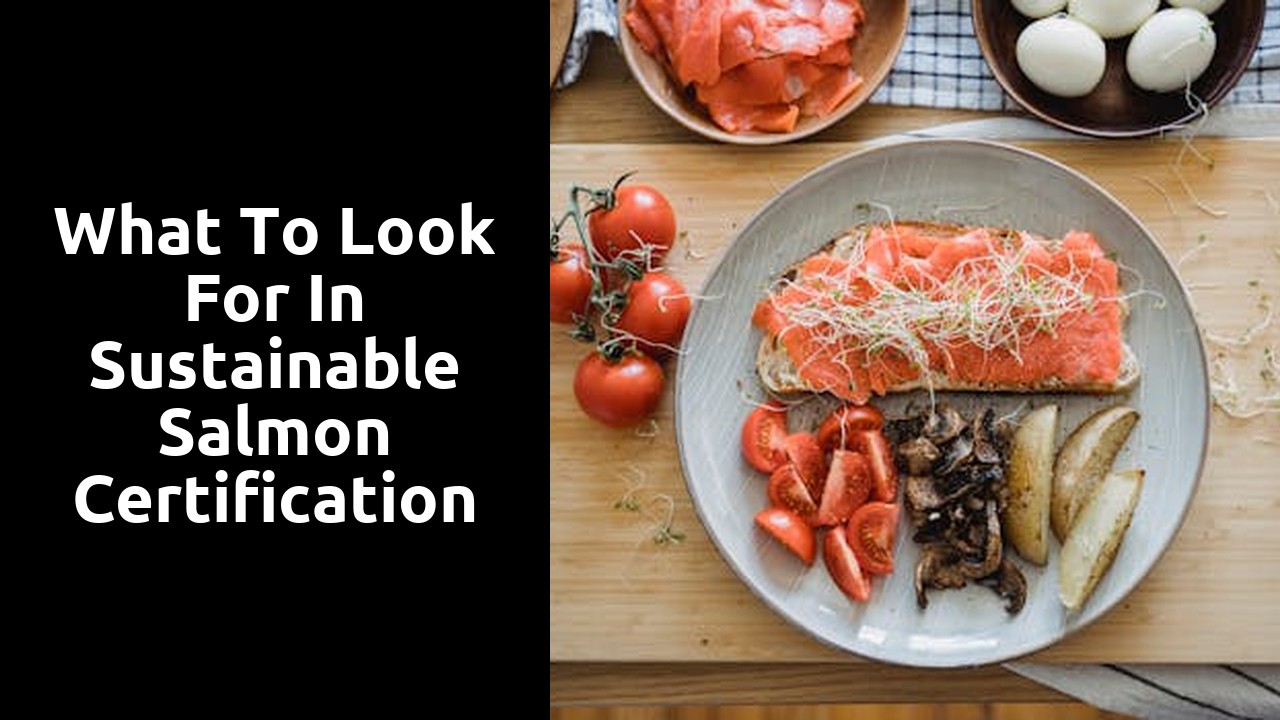What to Look for in Sustainable Salmon Certification

Consumer Awareness
It is crucial for consumers to be well-informed when it comes to sustainable salmon certification. By understanding the various labels and logos associated with sustainable salmon, shoppers can make more environmentally-conscious choices. Recognised certification bodies such as the Marine Stewardship Council (MSC) and Aquaculture Stewardship Council (ASC) provide assurance that the salmon has been sourced sustainably, thereby helping consumers support responsible fishing practices.
In addition to labels and logos, consumers should consider the compliance monitoring processes of the certification bodies. Ensuring that regular audits and inspections are conducted helps guarantee that the salmon products meet the strict sustainability standards set by these organisations. By being aware of the certification process and requirements, consumers can make informed decisions that align with their values of supporting sustainable and ethical practices in the fishing industry.
Understanding Labels and Logos
When it comes to ensuring the sustainability of salmon products, it's crucial to understand the various labels and logos that appear on packaging. Consumers play a vital role in driving demand for sustainably sourced salmon, and being able to decipher these symbols can help make informed choices. Look out for certifications from bodies such as the Marine Stewardship Council (MSC) or Aquaculture Stewardship Council (ASC), which indicate that the salmon has been sourced responsibly.
These certifications often involve rigorous standards that producers must adhere to, such as sustainable farming practices, welfare considerations, and traceability throughout the supply chain. By choosing salmon products bearing these labels, consumers can support the preservation of marine ecosystems and the livelihoods of those working in the industry. Additionally, some logos may also indicate organic or environmentally friendly practices that further contribute to sustainable salmon production.
Compliance Monitoring
Compliance monitoring plays a critical role in ensuring that sustainable salmon certifications are upheld to the highest standards. This process involves regular audits and inspections to verify that the salmon farms are meeting the required criteria set by the certification body. These audits are conducted by independent third-party assessors who evaluate various aspects of the salmon farming operations to ensure compliance with sustainability standards.
Regular audits and inspections are essential for maintaining the integrity of sustainable salmon certifications. By having a robust compliance monitoring system in place, consumers can trust that the salmon they are purchasing has been produced in an environmentally responsible and socially ethical manner. This not only benefits the consumers but also helps to drive the industry towards more sustainable practices overall.
Regular Audits and Inspections
Regular audits and inspections play a crucial role in ensuring the credibility and integrity of sustainable salmon certification schemes. These periodic assessments are essential to verify that the certified salmon producers comply with the required standards and practices. By conducting comprehensive audits and inspections, certification bodies can identify any potential non-compliance issues and work with producers to address and rectify them promptly.
The transparency and accountability brought about by regular audits and inspections provide consumers with the assurance that sustainable salmon products meet the environmental and social criteria set by the certification schemes. In addition to upholding the credibility of certified salmon, these monitoring activities also help in fostering continuous improvement within the industry by encouraging producers to adopt best practices and uphold the highest standards of sustainability.
Market Access
Sustainable salmon certification plays a vital role in granting market access to producers in the seafood industry. With an increasing demand for eco-friendly seafood options, consumers worldwide are seeking out products that meet high environmental and social standards. Certification schemes provide assurance to consumers that the salmon they are purchasing has been sourced ethically and sustainably, making it easier for certified producers to access and penetrate global markets.
Moreover, market access for certified sustainable salmon can also lead to higher price premiums for producers. As consumers become more conscientious about the environmental impact of their food choices, they are often willing to pay a premium for products that are certified sustainable. This creates a competitive advantage for certified producers, allowing them to command higher prices for their salmon products in the market. Additionally, market access enables certified producers to reach a wider customer base, increasing their sales and overall profitability.
International Recognition
One crucial aspect that underscores the value of sustainable salmon certification is international recognition. When a certification scheme is acknowledged and respected at a global level, it not only indicates compliance with comprehensive standards but also enhances the reputation of the certified salmon. International recognition ensures that the certified salmon can access broader markets, both domestically and overseas, creating more opportunities for producers and suppliers in the industry.
The international recognition of sustainable salmon certification schemes also facilitates stronger partnerships and collaborations across borders. When certification is accepted and valued worldwide, it opens avenues for knowledge sharing, best practices dissemination, and collaborative initiatives that can contribute to the continuous improvement of sustainability standards in the salmon industry. Therefore, seeking certification that holds international recognition can be instrumental in promoting sustainable practices and fostering a more responsible and environmentally-conscious approach to salmon production.
Related Links
What Are Sustainable Seafood ChoicesHow to Choose Sustainable Salmon Fillets
How to Cook Sustainable Salmon Fillets
Roundup: Best Sustainable Salmon Fillets Brands
Review: The Impact of Sustainable Salmon Fillets
10 Sustainable Seafood Choices for Ocean-friendly Eating